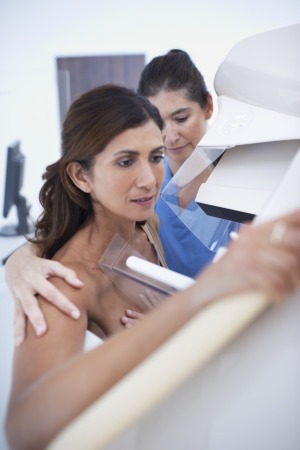por
Loren Bonner, DOTmed News Online Editor | May 21, 2012

Philips MicroDose
Mammography System
From the May 2012 issue of HealthCare Business News magazine
This past March, Governor Bob McDonnell signed legislation making Virginia the third state to require radiologists to notify women if they have dense breasts. Laws in Connecticut and Texas already require doctors to tell their patients if they have dense breast tissue, and that a supplemental screening test, such as a breast ultrasound, is recommended. Nine other states are considering similar measures this year, and federal legislation was introduced in Congress last October.
For years, it’s been known that dense breast tissue increases a woman’s likelihood of cancer. Results from the first American College of Radiology Imaging Network’s 6666 breast cancer trial, published in 2008, showed ultrasound with mammography found an additional 1.1 to 7.2 cancers per 1000 high-risk women with dense breast tissue. Today, new technologies are further enhancing the ability of mammography to detect cancer in women with dense breast tissue.
The new marketplace for dense breast tissue imaging




Ad Statistics
Times Displayed: 36789
Times Visited: 1000 Stay up to date with the latest training to fix, troubleshoot, and maintain your critical care devices. GE HealthCare offers multiple training formats to empower teams and expand knowledge, saving you time and money
A more recent ACRIN 6666 study took the same population of women but added an MRI to yearly mammogram and ultrasound screenings. Results, published in JAMA on April 3, conclude that the addition of ultrasound or MRI to mammography in women at increased risk for breast cancer resulted in higher cancer detection rates.
The American Cancer Society already recommends a yearly MRI and mammogram for high-risk women, based on a greater than 20 percent lifetime risk of breast cancer. And women at moderately increased risk, a 15 to 20 percent lifetime risk, are encouraged to talk with their doctor about the benefits and drawbacks of adding MRI screenings to their yearly mammogram. Most insurance will also cover a breast MRI for high-risk women.
Additionally, ACS recommends that women who get a breast MRI should do so at a facility that can offer an MRI-guided breast biopsy at the same time.
The Massachusetts-based company, Aurora Imaging Technology, Inc., has been on the forefront of breast MRI since 2005, when it launched its flagship product, the Aurora 1.5T Dedicated Breast MRI System, designed for breast cancer diagnosis and biopsy. Today, at least 60 imaging facilities around the world have integrated the technology.
"In addition to screening of high-risk women, we see breast MRI used for diagnostic purposes as well. For example, we see it used for newly diagnosed breast cancers to help identify the extent of the disease," says Beth Kinsella, director of marketing for Aurora.

